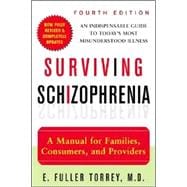
Note: Supplemental materials are not guaranteed with Rental or Used book purchases.
Purchase Benefits
The New copy of this book will include any supplemental materials advertised. Please check the title of the book to determine if it should include any access cards, study guides, lab manuals, CDs, etc.
The Used, Rental and eBook copies of this book are not guaranteed to include any supplemental materials. Typically, only the book itself is included. This is true even if the title states it includes any access cards, study guides, lab manuals, CDs, etc.
Schizophrenia is to psychiatry what cancer is to medicine: a sentence as well as a diagnosis.
W. Hall, G. Andrews, and G. Goldstein,
Australian and New Zealand Journal of Psychiatry, 1995
Schizophrenia, I said. The word itself is ominous. It has been called "one of the most sinister words in the language." It has a bite to it, a harsh grating sound that evokes visions of madness and asylums. It is not fluid like démence, the word from which "dementia" comes. Nor is it a visual word like écrasé, the origin of "cracked," meaning that the person is like a cracked pot. Nor is it romantic like "lunatic;' meaning fallen under the influence of the moon (which in Latin is luna). "Schizophrenia" is a discordant and cruel term, just like the disease it signifies.
Our treatment of individuals with this disease has, all too often, also been discordant and cruel. It is, in fact, the single biggest blemish on the face of contemporary American medicine and social services; when the social history of our era is written, the plight of persons with schizophrenia will be recorded as having been a national scandal. Consider the dimensions of the disaster.
Excerpted from Surviving Schizophrenia: A Manual for Families, Consumers, and Providers by E. Fuller Torrey
All rights reserved by the original copyright owners. Excerpts are provided for display purposes only and may not be reproduced, reprinted or distributed without the written permission of the publisher.